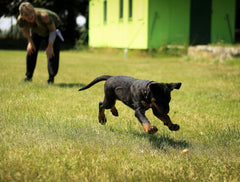
There are many people in the world who are reading news stories and articles about the coronavirus every single day. They are staying in tune with each state’s statistics and how this virus is affecting the area in which they live in. Some people are even going as far as worrying about their pets during the outbreak of the coronavirus.
While the truth is that your pet will probably not get the coronavirus that humans all around the world are getting, there are still some things that you might want to know, including the different effects of coronavirus in pets.
Coronavirus and Pets

The Covid-19 that humans from all around the world are getting isn’t likely to affect your pet. According to the World Health Organization, evidence doesn’t show that pets will get infected with Covid-19. With this being said, there are versions of the coronavirus that dogs may get. However, these versions don’t affect humans.
Positive Testing for Dogs and the Coronavirus

While there has been a weak positive test result in a dog from Hong Kong, this doesn’t insinuate that dogs can catch Covid-19 or get sick from this specific virus. The truth is that pets aren’t going to pass Covid-19 to humans. However, they can test for low levels of Covid-19 if they get infected by a human. With this being said, there is no research that says Covid-19 spreads from humans to pets or vice versa.
Dogs can, however, get a different version of the coronavirus. That is called the canine coronavirus disease or CCoV. This will cause gastrointestinal issues such as diarrhea.
Regardless of whether pets can transmit this disease to humans or not (even though research shows the latter), you should always wash your hands before and after handling your pet. This will prevent bacteria from being passed from you to your pet and vice versa. You should also know the signs to look out for which will indicate that your dog is sick.
Cats and the Coronavirus

As of March 21, 2020 there are no reports of cats getting Covid-19. However, there is something known as feline coronavirus that is commonly found in cats. This is an entirely different strain and humans can’t catch it. The most common symptom found in this type of coronavirus is diarrhea.
Quarantining Pets Due to the Coronavirus

Many pet owners are wondering whether they need to quarantine their pets due to the coronavirus in pets. The only recommendation for quarantining a pet is when someone else in the house has become infected with Covid-19. In addition, your dog may need to be quarantined if you live in an area that has local quarantine in place. In this instance, you can probably just walk your pet around your yard and stay clear of other people.
It is not likely for your pet to get Covid-19. However, there are types of known coronavirus that pets, such as dogs and cats, may get. Those types of the virus aren’t transmittable to humans and evidence shows that pets aren’t likely to get Covid-19 from humans, either. Even with these facts, however, if you do get Covid-19, you should do your best not to touch your pet until you are cleared.
Additionally, getting your pet properly vaccinated can help a great deal.
Can coronavirus be passed on to pets?
Can pets spread the coronavirus?
How to protect pets from coronavirus?
Check out our blog and follow me on LinkedIn to stay up-to-date!




